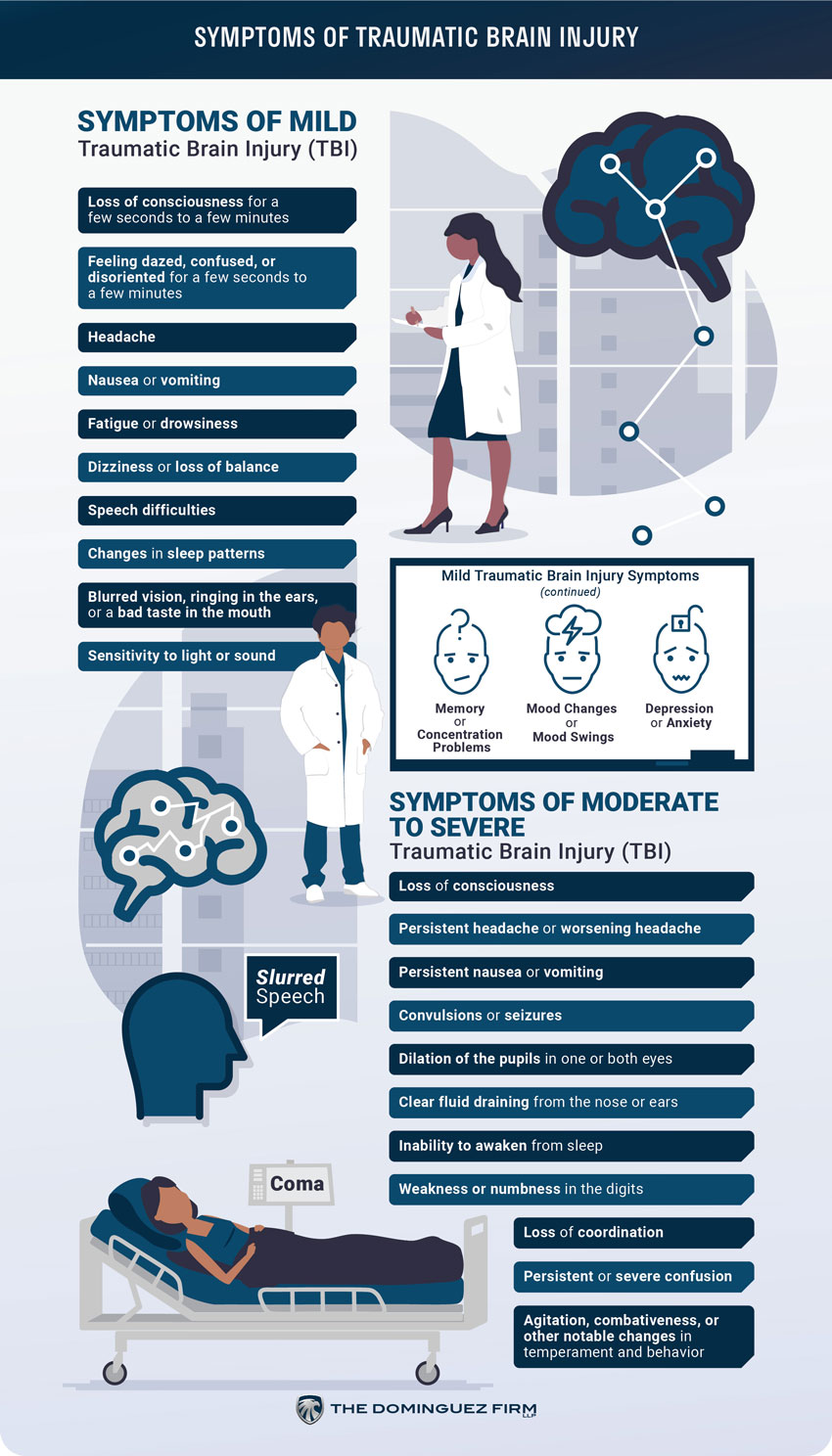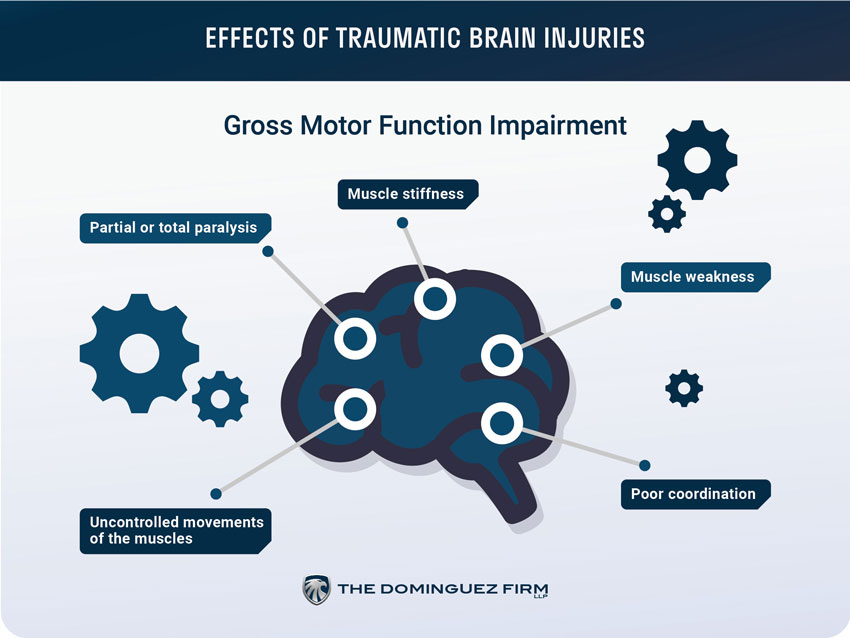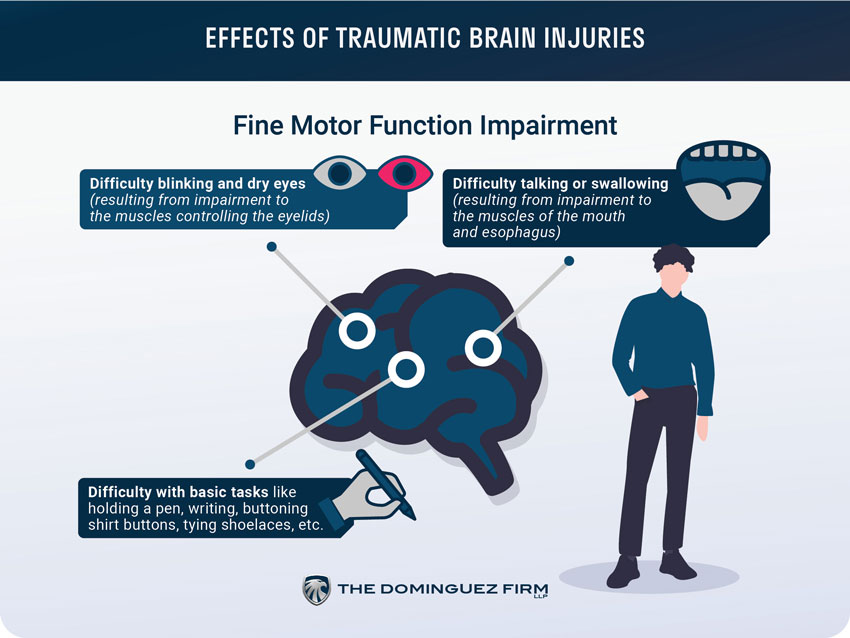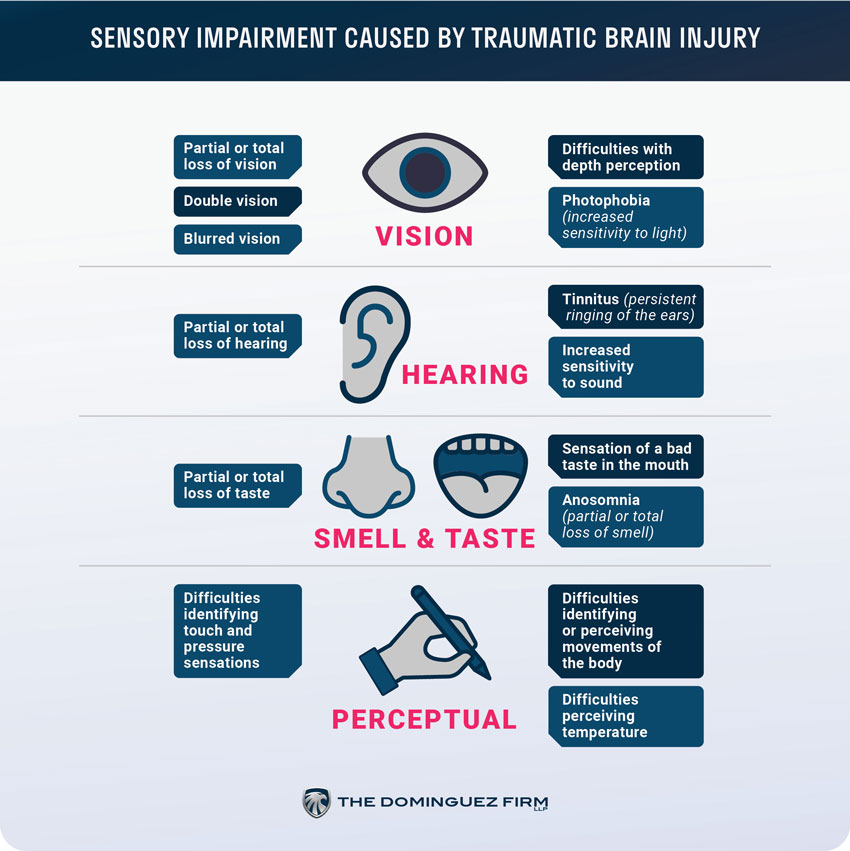Traumatic Brain Injuries, also known as TBIs, are unfortunately common, extremely serious, and can result in permanent damage or disability. According to the Centers for Disease Control (CDC), in 2021 there were nearly 69,000 deaths due to TBIs in the United States. Falls were responsible for almost half of those deaths.
Our award-winning personal injury attorneys have assisted brain injury clients in the Los Angeles area with massive verdicts and settlements in the tens of millions of dollars for clients who have suffered traumatic brain injuries. We have seen first-hand how brain injuries affect victims and their families and are committed to justice for our clients.
If you or a loved one suffered a traumatic brain injury in an accident, call the award winning personal injury lawyers at The Dominguez Firm at 800-818-1818 for a free consultation today.
What follows is more information about TBIs, your rights, and how The Dominguez Firm can help you.
What is a Traumatic Brain Injury?
Any injury to the brain resulting from trauma falls under the classification of traumatic brain injury. A trauma injury is a physical injury that is sudden onset and of a severity that likely requires immediate medical attention. These brain injuries most commonly result from a blow, jolt, or collision to the head or body that impacts the brain.
Traumatic brain injuries differ from non-traumatic brain injuries or acquired brain injuries (ABI), based on their cause. ABI results from an illness or pre-existing condition within the body, such as:
- Stroke
- Lack of oxygen to the brain (hypoxia)
- Tumor
- Brain cancer
- Brain infection or inflammation
There is considerable overlap between the symptoms of TBI and ABI, and diagnosticians will take into account whether the onset of symptoms was directly precipitated by an instance of head trauma, for example, a blow to the head, in order to properly diagnose TBI or ABI.

Symptoms of TBIs
A TBI is classified according to the severity of the injury and diagnosed based on the nature and duration of symptoms.
Symptoms of Mild Brain Injuries include:
- Loss of consciousness for a few seconds to a few minutes
- Feeling dazed, confused, or disoriented for a few seconds to a few minutes
- Headache
- Nausea or vomiting
- Fatigue or drowsiness
- Dizziness or loss of balance
- Speech difficulties
- Changes in sleep patterns
- Blurred vision, ringing in the ears, or a bad taste in the mouth
- Sensitivity to light or sound
- Memory or concentration problems
- Mood changes or mood swings
- Depression or anxiety
Anyone experiencing any of the above symptoms should seek immediate medical attention.
Symptoms of moderate to severe traumatic brain injuries include all of the above, as well as the onset or continuation of any of the following symptoms within hours or days following the trauma incident:
- Loss of consciousness
- Persistent headache or worsening headache
- Persistent nausea or vomiting
- Convulsions or seizures
- Dilation of the pupils in one or both eyes
- Clear fluid draining from the nose or ears
- Inability to awaken from sleep
- Weakness or numbness in the digits
- Loss of coordination
- Persistent or severe confusion
- Agitation, combativeness, or other notable changes in temperament and behavior
- Slurred speech
- Coma
Common Causes of TBIs
According to the CDC, the top 3 leading causes of TBI are:
- In 2013, falls accounted for 47% of all reported traumatic brain injuries, and disproportionately affected younger and older age cohorts. Falls accounted for 54% of reported TBI in children under 14, and 79% of adults 65 and older.
- Being struck by or against an object. An example would be sports-related concussions. 15% of reported traumatic brain injuries were due to impact incidents in 2013, with children under 15 being at highest risk.
- Motor vehicle accidents. In 2013, 14% of all reported incidents of TBI were related to traffic accidents, which further accounted for 19% of TBI-related deaths.
Effects of TBIs
Many victims of moderate to severe TBI will experience long-term deficits or disability in their motor functions (movement of the body). Motor skills are classified in two categories: (1) gross motor skills, which are involved in the movement of the arms, legs, and other large body parts; and (2) fine motor skills, which are involved in smaller movements of the fingers, toes, wrists, hands, face, and other smaller body parts.

Examples of gross motor function impairment that may result from TBI include:
- Partial or total paralysis
- Uncontrolled movements of the muscles
- Muscle stiffness
- Muscle weakness
- Poor coordination

Examples of fine motor function impairment that may result from TBI include:
- Difficulty blinking and dry eyes (resulting from impairment to the muscles controlling the eyelids)
- Difficulty talking or swallowing (resulting from impairment to the muscles of the mouth and esophagus)
- Difficulty with basic tasks like holding a pen, writing, buttoning shirt buttons, tying shoelaces, etc.
Cognitive Impairment
Cognitive impairment is common among TBI patients and can have a significant impact on their quality of life. Disruptive primary cognitive impairment can include:
- Disturbances of attention
- Impaired memory
- Impaired executive functioning
These primary disturbances to cognitive functioning can result in a variety of secondary symptoms that impact the most basic functions of everyday life, including:
- Distractibility
- Confusion
- Impulsiveness
- Lack of inhibition
- Difficulties with planning
- Difficulties with abstract thinking
- Difficulties determining right from wrong
Speech and Language
TBI can have substantial impacts on a patient’s speech and language faculties, including:
- Aphasia (difficulty talking or expressing ideas, understanding language, and reading and writing)
- Slurred speech
- Abnormally slow or fast speech
- Difficulties with reading comprehension
Sensory Impairment

TBI can cause irreversible impairment to a victim’s abilities to perceive and process sensory stimuli.
Vision
- Partial or total loss of vision
- Double vision
- Blurred vision
- Difficulties with depth perception
- Photophobia (increased sensitivity to light)
Hearing
- Partial or total loss of hearing
- Tinnitus (persistent ringing of the ears)
- Increased sensitivity to sound
Smell and Taste
- Anosomnia (partial or total loss of smell)
- Partial or total loss of taste
- Sensation of a bad taste in the mouth
Perceptual
- Difficulties identifying touch and pressure sensations
- Difficulties perceiving temperature
- Difficulties identifying or perceiving movements of the body
Emotional and Behavioral Impacts
Emotional and behavioral impacts are among the most difficult long-term effects of TBI, since they can be secondary effects of difficulties coping with the physical and cognitive symptoms outlined above. Victims may suffer from depression, emotional volatility, irritability, aggression, social dependency, and lack of motivation.
Luckily, doctors have had success treating TBI patients exhibiting these symptoms with psychological counseling and cognitive behavioral therapy.
How to Prevent TBI
- Buckle up. Safety belts are the easiest safeguard from car accident related TBI. Use your safety belt every single time you are a driver or passenger in a motor vehicle, before starting the ignition. If you have children, be sure they are secured with an appropriate car seat, booster seat, or safety belt depending on their age before operating your motor vehicle.
- Never drive while under the influence of alcohol or drugs.
- Wear a helmet. When operating or performing any of the following, always wear a helmet and ensure your children wear helmets:
- Riding a bicycle, motorcycle, snowmobile, ATV, or scooter
- Contact sports such as football, hockey, or boxing
- Riding a skateboard or rollerblades/skates
- Riding a horse
- Skiing or snowboarding
- Ensure a safe environment for children and seniors. The young and the old are most at risk for TBI. Take extra precautions at securing their living environment by:
- Installing window guards to prevent children from opening windows
- Using safety gates at the top and bottom of stairs
- Removing tripping hazards
- Putting non-slip mats in showers and bathtubs or other slippery surfaces
- Install hand rails next to stairways, bathtubs, and toilets
When You Need a Traumatic Brain Injury Lawyer
If you or someone you know has suffered head trauma due to someone else’s negligence, you need an experienced traumatic brain injury attorney on your side. The award-winning Los Angeles Brain Injury Lawyers at The Dominguez Firm have represented clients suffering from traumatic and catastrophic brain injuries to recuperate vital compensation in the millions of dollars for their brain injury cases. Our team of injury attorneys can help you:
- Pay your medical bills
- Recover lost wages
- Recuperate money for your family
- Protect you from disability discrimination
- Achieve justice for your injuries
- Protect your community and hold negligent parties accountable
- Regain control of your life after your injury
We handle legal cases on a NO RECOVERY, NO FEE, NO COST basis, meaning our firm does not get paid unless you win your case. Call our offices today for a free consultation with one of our attorneys about your case at 800-818-1818 and find out how we can help you.
Helpful Articles From Our Traumatic Brain Accident Lawyers
My experience was good. They made sure to kept me in the loop and made sure to let me know what was going on the whole time. My mom has used other attorneys and this experience was beyond better. I would definitely recommend them!
— Ashley Magana
The attorneys were always available and answered my questions. I would recommend them to anyone. Zoe is the best!
— Janet Salazar
My experience with The Dominguez Firm and the attorneys was really good. They were very informative and always returned my calls.
— Jocelyn Gonzalez
